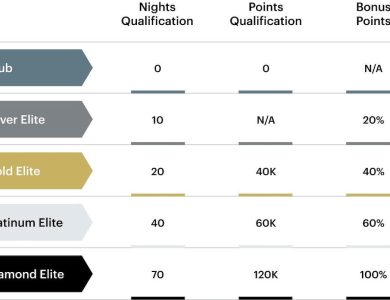
In an era where travel has become more accessible than ever, loyalty programs have emerged as powerful tools for airlines, hotels, and other travel-related businesses to foster customer retention and encourage repeat patronage. These programs, often enticing with promises of exclusive perks, upgrades, and cost savings, have garnered a significant following among frequent travelers. However, an intriguing question arises: Are these loyalty programs inadvertently curtailing the very freedom they promise to enhance? This article delves into the mechanics of loyalty programs, examining their influence on consumer behavior and travel choices. By analyzing the potential constraints they impose on travelers’ flexibility and spontaneity, we aim to provide a balanced perspective on whether the benefits of loyalty programs truly outweigh their limitations, or if they subtly tether travelers to a cycle of predictability and obligation.
Impact of Loyalty Programs on Travel Choices
In today’s travel landscape, loyalty programs have become a powerful tool in shaping consumer behavior and influencing travel decisions. These programs often offer enticing benefits such as free flights, hotel upgrades, and exclusive access to amenities. However, while these perks can enhance the travel experience, they may also inadvertently limit travelers’ choices. Many travelers find themselves opting for airlines or hotel chains they have loyalty points with, even if other options might be more convenient or cost-effective. This trend raises the question of whether loyalty programs are creating a narrow path for travel choices, guiding individuals towards specific brands and away from a more diverse array of travel experiences.
- Restricted Flexibility: Loyalty programs can lead to a lack of flexibility, as travelers might prioritize point accumulation over exploring new destinations or airlines.
- Brand Dependence: As loyalty points accumulate, travelers often develop a strong preference for certain brands, potentially overlooking better deals or services offered by competitors.
- Psychological Influence: The psychological allure of redeeming points can overshadow practical travel considerations, such as flight times and overall costs.
While loyalty programs undeniably provide value, it’s crucial for travelers to remain aware of how these incentives might subtly guide their choices. Balancing the benefits of loyalty rewards with the desire for diverse travel experiences is key to maintaining travel freedom.
Evaluating the Restrictions Imposed by Reward Schemes
The allure of loyalty programs lies in their promise of exclusive rewards and savings, yet these schemes often come with a set of restrictions that can subtly curb a traveler’s freedom. At the heart of these programs are reward points, which may seem like a straightforward benefit but often bind customers to specific airlines, hotels, or travel dates. This dependency can lead to a phenomenon known as the “golden handcuffs,” where the perceived value of accumulated points overshadows the flexibility to choose other, potentially more convenient or affordable options.
- Limited Redemption Options: Many loyalty programs restrict the use of points to particular flights or room categories, often leaving travelers with fewer choices.
- Blackout Dates: High-demand periods such as holidays or weekends are frequently excluded from redemption options, limiting travel planning around personal schedules.
- Expiration Dates: Points often come with expiry dates, pressuring travelers to use them within a specific timeframe, sometimes leading to unnecessary or rushed travel decisions.
Moreover, loyalty schemes often encourage travelers to prioritize point accumulation over their own preferences, such as choosing a less convenient flight or a less desirable hotel simply to earn more points. This behavior can ultimately detract from the overall travel experience, as individuals might compromise on comfort or itinerary flexibility in pursuit of maximizing rewards. By critically assessing these schemes, travelers can better navigate the trade-offs between rewards and personal freedom.

Balancing Benefits and Limitations for Travelers
Loyalty programs, while offering numerous advantages, can also come with certain constraints for travelers. On the positive side, these programs often provide exclusive perks such as priority boarding, complimentary upgrades, and access to premium lounges. Frequent travelers can benefit from earning points or miles that can be redeemed for free flights or hotel stays, potentially reducing travel costs. Moreover, loyalty programs can offer a sense of community and brand familiarity, making travelers feel more secure and valued.
However, the limitations are equally significant. Some travelers may find themselves bound to specific airlines or hotel chains to maximize their rewards, which can restrict travel options and spontaneity. Loyalty programs often require a substantial amount of travel to reach elite status, which might not be feasible for all. Furthermore, blackout dates and limited availability of reward seats can make it challenging to use accrued points when desired. These constraints may lead to a more structured travel experience, potentially limiting the freedom to explore diverse destinations and accommodations.

Strategies for Maximizing Travel Flexibility
To ensure you’re not boxed in by loyalty programs, consider adopting several savvy strategies that prioritize flexibility. Diversifying your loyalty programs can be a game-changer. Instead of putting all your eggs in one basket, spread your travel across multiple programs. This approach allows you to capitalize on various benefits and keeps your options open if one program becomes less advantageous. Moreover, choosing transferable points programs can significantly enhance your flexibility. These programs, such as Chase Ultimate Rewards or American Express Membership Rewards, allow you to transfer points to a variety of airlines or hotels, providing you with a wider array of choices when planning your travels.
- Book refundable tickets: While often pricier, refundable tickets offer the freedom to change plans without penalties.
- Utilize travel insurance: Protect yourself from unforeseen circumstances that could disrupt your travel plans.
- Stay informed: Regularly check for changes in loyalty program policies to avoid unexpected restrictions.
- Be open to alternative destinations: If your preferred destination is unavailable, consider other locations that offer similar experiences.
By implementing these strategies, you can navigate the world of loyalty programs with greater ease and adaptability, ensuring your travel experiences remain as spontaneous and enjoyable as possible.



